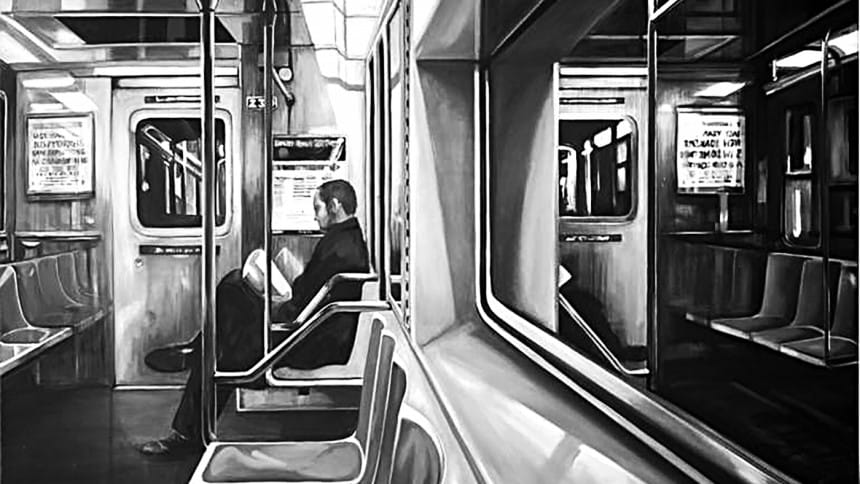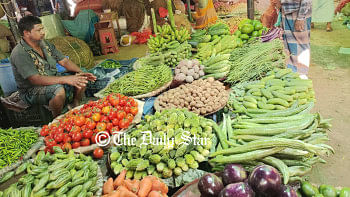Freedom

On our way to Dhahran from Austin, we plan to stop at Pennsylvania, New York and London. I have never been to New York and it would be a shame to leave America without visiting the city. Nishat has been to New York on a previous occasion and this time he wants to spend time with Dipa, her childhood friend.
We find Dipa and her husband, Azim, waiting for us at JFK airport. They drive us to their home at Long Island. As days roll by, Nishat and Dipa get busier in each other's company. Azim is busy with his business. I am left on my own. It is Alam, Azim's younger brother, who comes to my aid.
Alam works in Manhattan. He commutes to work on the train. He suggests that the best way to see New York is by walking and invites me to join him one morning to get to the city.
When the train arrives at the Manhattan underground terminal, I am struck by the sheer mass of people. Trainloads of passengers are arriving every minute. I have never seen anything like it before.
Once out of the terminal, the passengers spread out quickly in all directions. It is like a rushing river thinning out at an estuary. Alam tells me to meet him at the same spot at five o'clock and then disappears into the crowd.
I buy a city map from the Subway news-agent. One quick glance tells me that, even with my poor sense of direction, there is no way I can get lost. The streets and avenues are aligned in north–south and east–west directions. I mark my position on the map. This is where I start and this is where I need to get back to at five.
The Rockefeller Centre is an impressive array of high-rise buildings on both sides of the road. The skyscrapers fascinate me as I look up at them against the backdrop of a blue sky with patches of drifting cloud. I sit on a roadside bench and look high up. The movement of the clouds gives a visual illusion, as if it is the buildings that are on the move.
I walk street after street, avenue after avenue. People are rushing in all directions, as if running late to catch a plane. There is no such thing as a peak hour – it is peak at all times. And then there are cars on the road, bumper to bumper. I notice that the drivers are cautious. The pedestrians ignore the 'Don't Walk' signs; they simply cross the road, expecting the drivers to give way at anytime.
I see subway signs all over the city. There is probably an equal number of people commuting underground. I stand at a corner and watch people appear and disappear in and out of the subway terminals. They are like ants moving in and out of their hole.
There are lots of stores on both sides of the road, big and small. It is only in the afternoon that I find footpath vendors busy with their merchandise: fruit, clothes, toys and all sorts of other things. Some people shop on their way home.
The newsagents probably make good business because the most sold items are the daily newspapers. People on buses, trains and in cafés spend their time reading them. Once the reading is done, they throw them in the bins. I watch some people picking them up – a smart move to save money, as well as trees.
The most wondrous thing of all is to watch the vast sea of people. They belong to all nations, races, cultures and religions. There are men and women, literate and illiterate, rich and poor, young and old, black and white, tall and short, fat and thin, healthy and sick, beautiful and ugly. This is the most incredible assembly of people I have ever seen. It is the most stunning melting pot I have ever experienced.
No one looks at others. Nobody knows anybody. There is no exchange of greetings or salutations. Everyone is on the move, fast, with no time to lose. There is no gathering for a political speech, protest or even a roadside show. Maybe the mayor does not allow any of these, or even snake charmers, palm readers or magicians, to make money on the street.
Unconsciously, I quicken my pace to keep up with thecrowd. I am a New Yorker now. No one is watching me. No one knows me. They do not know my name, my fame or position. Nor do I know anybody. I do not greet them and nobody greets me. I salute nobody and nobody salutes me. I have no clue as to who is rich or poor, literate or illiterate, a man of distinction or a thief. We are all a drop in the ocean or a grain of sand on the beach. Some grains are large and some are tiny, some are shiny and some are dark. But that is what makes it a beach; that is what makes it a melting pot.
I lose myself and, along with it, I lose my pride, dignity and sense of superiority. I am no longer aware that "I am handsome, intelligent and wise, with a PhD from a distinguished US university". I feel a sense of exhilaration, joy and freedom. I am free. I am released from my shackles: my ego and worldly possessions. I realize that the craving to acquire is nothing but a chain that not only keeps me in bondage, but also sustains my ignorance, blindness and bitterness in life.
I look at my watch. It is time. I walk fast to get to the terminal by five.
Tohon is a short-story writer. He regularly writes for The Daily Star.

 For all latest news, follow The Daily Star's Google News channel.
For all latest news, follow The Daily Star's Google News channel. 



Comments